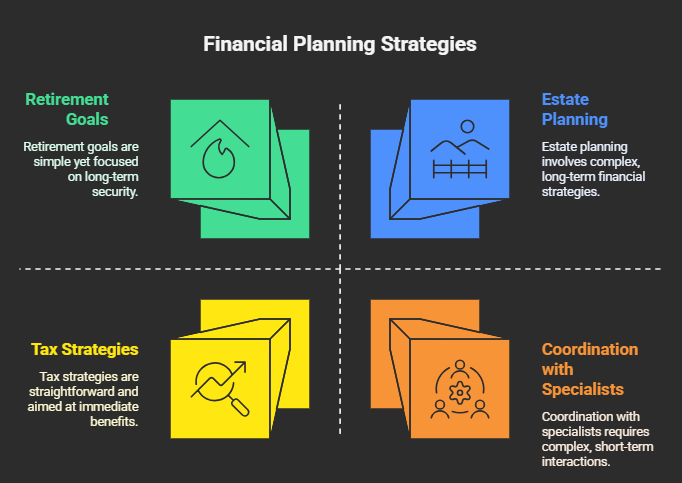What Is Not a Service Provided by Wealth Managers? Let’s Explore
I often hear the question, “What is not a service provided by wealth managers?” It makes sense—wealth managers wear many hats, from guiding you through intricate tax strategies to helping plan your estate. But they’re not a one-stop shop for every financial or personal need. In this post, I want to clarify where wealth managers typically draw the line so you know when to call them and when another professional might be the better fit.
Understand Wealth Management

Wealth management is all about creating a long-term strategy for high-net-worth (HNW) or ultra-high-net-worth (UHNW) individuals. This strategic approach can include specialized services such as:
- Investment advice tailored to your goals
- Estate planning for passing down assets
- Tax planning strategies to minimize liabilities
- Retirement planning that aligns with your lifestyle ambitions
From my perspective, wealth managers go beyond simple financial advising because they handle multiple moving parts of your financial life. Many also coordinate with outside specialists, such as attorneys or accountants, to create a cohesive plan (though they usually don’t offer legal representation themselves).
Identify What They Typically Provide

Wealth managers generally excel at bringing together various financial services under one roof. You’ll see them focusing on:
- Money management and portfolio optimization
- Strategic tax and estate planning
- Risk analysis and insurance recommendations
- Customized retirement roadmaps
Because of their broad perspective, many individuals view a wealth manager as the “quarterback” of their finances, calling the plays and making sure all the pieces line up.
Still, it’s easy to assume that “managing wealth” covers every financial matter under the sun. Let’s get to the core of what is not usually on their service list.
What They Usually Don’t Provide
Budgeting And Money Education

Wealth managers typically work with clients who already have significant investable assets—often a minimum of $250,000 to $1 million or more, depending on the firm (Asena Advisors). Since these clients already have established wealth, day-to-day budgeting advice and financial education on basics (like saving for a new car) aren’t top priorities. If you’re looking for help with budgeting or want foundational money lessons, a dedicated financial planner or coach might be a better match.
Concierge Services For Non-Financial Needs

Sometimes, I meet folks who assume wealth managers will handle everything from booking personal travel to managing real estate renovations. In reality, those tasks often fall under “concierge” or “lifestyle” services typically offered by family offices—specialized entities catering to ultra-affluent households. Wealth managers stick to finances, taxes, and investments (Investopedia) rather than everyday household management.
In-Depth Legal Representation

Wealth managers aren’t attorneys. Although they may coordinate with or recommend a lawyer for tasks like setting up trusts or finalizing estate plans, they don’t directly provide legal representation. For complex legal questions—things like challenging a will or handling a property dispute—you’ll need a licensed attorney. Wealth managers can manage the big-picture strategy, but the legal legwork typically resides in a law firm.
Ready For A Wealth Manager?
If you have substantial assets and want a comprehensive approach, a wealth manager might be the strategic partner you need. You can dig into helpful questions to ask with how to choose a wealth manager. Wondering if your holdings meet the typical threshold? Get a sense of common entry points with wealth management minimum.
If you’re seeking more detail about how fiduciary standards work at major firms, you might also check is fidelity a fiduciary and is ameriprise a fiduciary. Both posts can help you see how large institutions handle the responsibility of acting in your best interest.
FAQs
- Do Wealth Managers Help With Day-To-Day Cash Flow?
Generally, no. They focus on investing and managing larger financial goals. For daily budgeting or debt management, a financial planner or money coach is a better choice. - Are Wealth Managers The Same As Financial Planners?
Not exactly. A financial planner offers broader, often more basic financial guidance. Wealth managers specialize in comprehensive strategies for high-net-worth clients, including estate planning, tax optimization, and investment management. - What If I Need Help Managing My Household Staff Or Schooling Expenses?
That typically falls under family office or concierge services, not wealth management. Wealth managers may point you to trusted providers, but they don’t handle these tasks themselves. - Can A Wealth Manager Provide Legal Advice?
They might share insights relevant to your finances, but legal advice and representation come from an attorney. Wealth managers and lawyers often collaborate, but each has a distinct role. - How Do Wealth Managers Charge?
Many charge a percentage of your assets under management (AUM), while others may bill hourly or tie fees to specific transactions (Investopedia). Always clarify fees upfront to avoid surprises.
If you’re a high-net-worth individual looking for a more holistic plan, wealth managers can be incredibly useful. They unify investments, estate planning, and tax strategies into one big-picture roadmap. Just remember they’re not your go-to for every single matter. Budgeting, lifestyle services, and legal intricacies usually demand other specialized pros. But when it comes to preserving and growing wealth, a dedicated wealth manager can be a valued partner in achieving long-term financial security.
Recent Posts
Wealth Management in Los Angeles to Consider
Finding the right wealth management firm can make a lasting...
Wealth Management in New York to Consider
New York City stands as a global financial hub, attracting...





